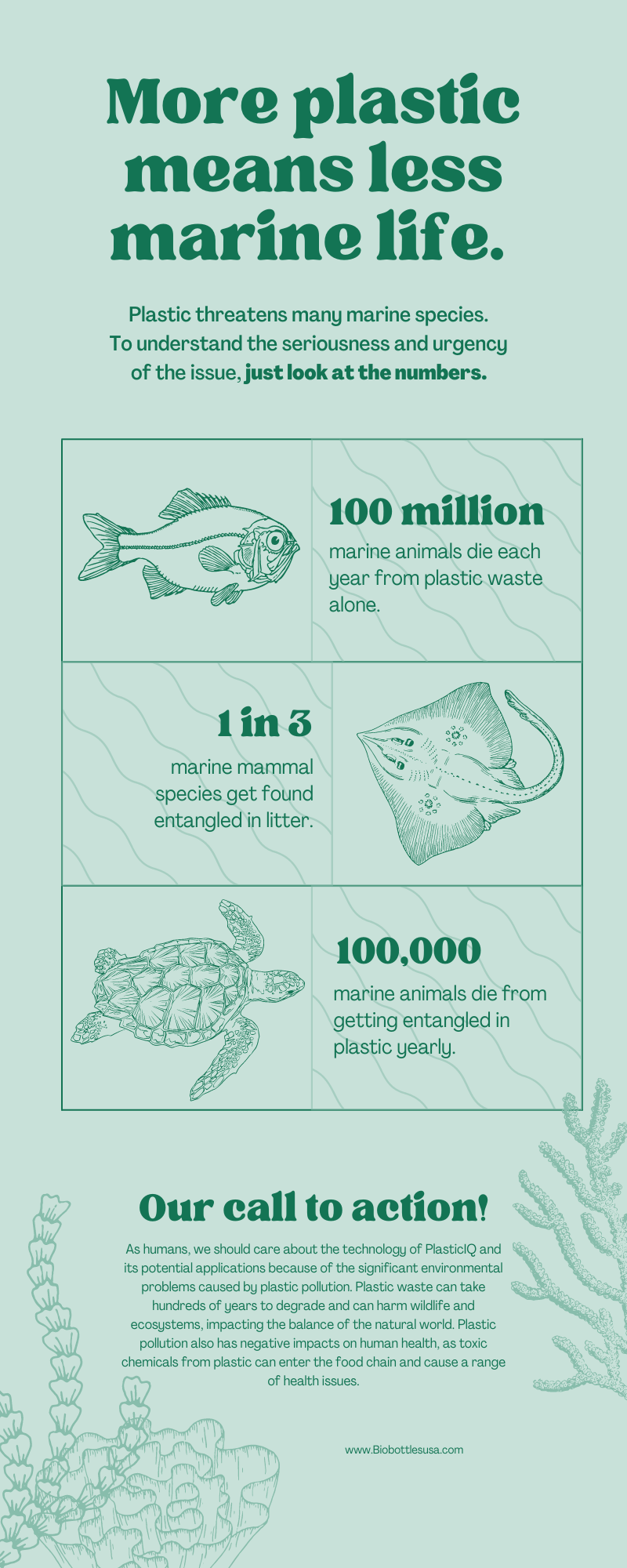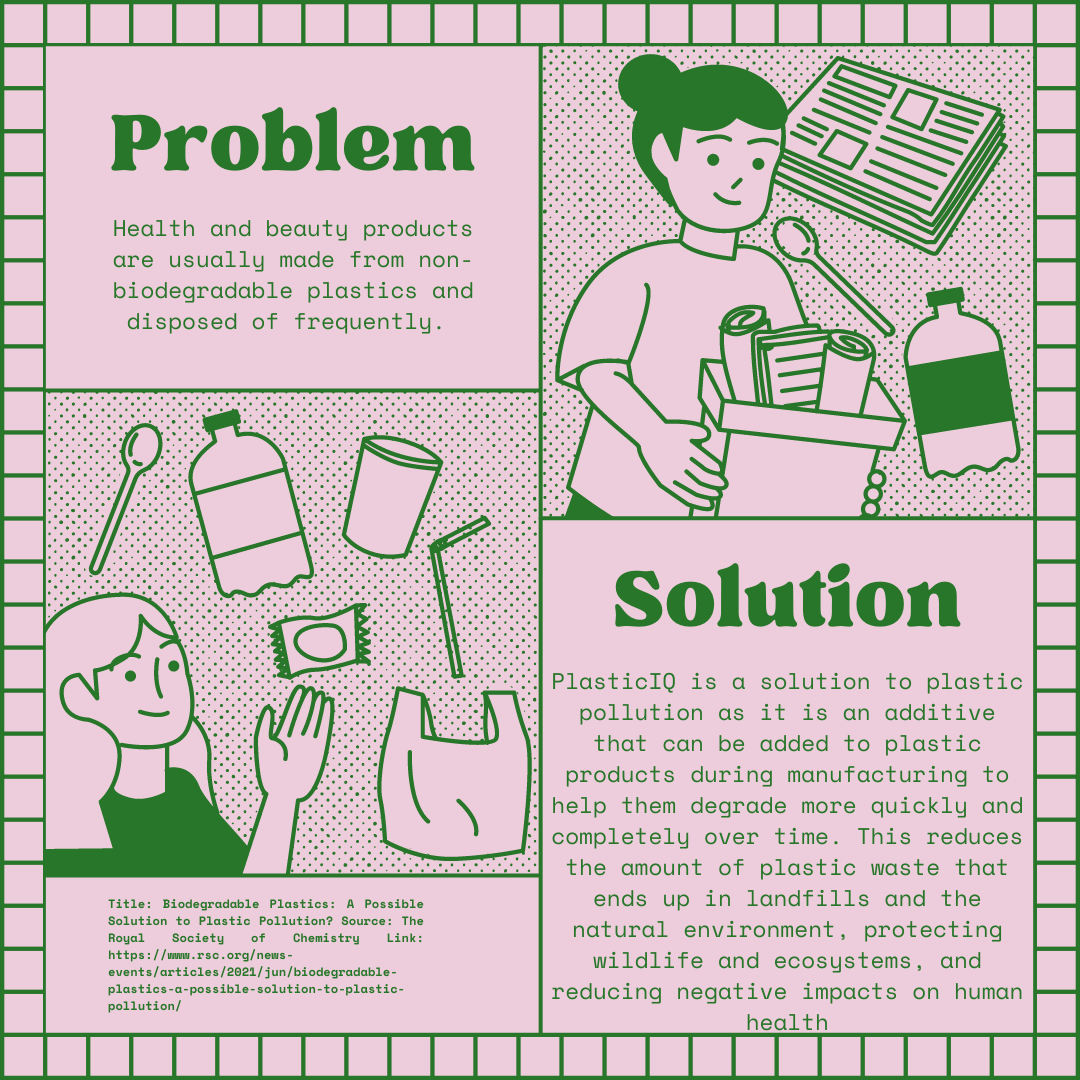Biodegradable Plastics are the future
Biodegradable plastics are good for the environment for several reasons. Firstly, they break down naturally into harmless substances through the process of biodegradation, which means they do not accumulate in landfills or oceans like traditional plastics. As a result, they can help to reduce the amount of plastic waste in the environment and decrease the risk of harm to wildlife and ecosystems.
Secondly, the production of biodegradable plastics typically requires less energy and resources than traditional plastics, which can result in lower greenhouse gas emissions and a reduced environmental footprint. Additionally, biodegradable plastics can be made from renewable resources such as corn starch or sugarcane, which can help to decrease reliance on non-renewable petroleum-based materials.
Overall, the use of biodegradable plastics has the potential to provide a more sustainable solution to the problem of plastic waste, as they can break down naturally without harming the environment. However, it is important to note that biodegradable plastics must still be disposed of properly in order to ensure they can biodegrade as intended.
How are Biodegradable Plastics good for the environment?
Biodegradable plastics are a type of plastic that can be broken down into natural substances by microorganisms, such as bacteria and fungi. These plastics can positively impact the environment as they do not accumulate in landfills or oceans like traditional plastics, reducing the risk of harm to wildlife and ecosystems (Thompson et al., 2009).
The production of biodegradable plastics typically requires less energy and resources than traditional plastics, resulting in lower greenhouse gas emissions and a reduced environmental footprint (Bastioli, 2005). Biodegradable plastics can also be made from renewable resources such as corn starch or sugarcane, which can help to decrease reliance on non-renewable petroleum-based materials (Meng et al., 2021).
Furthermore, the use of biodegradable plastics can also positively impact human health. Traditional plastics can release harmful chemicals, such as bisphenol A (BPA), into the environment and food chain, which can have negative effects on human health (Rochman et al., 2013). Biodegradable plastics, however, are made from natural materials and do not release harmful chemicals into the environment.
Overall, biodegradable plastics offer a promising solution to the problem of plastic waste and can positively impact both the environment and human health through their natural breakdown and use of renewable resources.
A horrifying truth
According to a study by the Ellen MacArthur Foundation (2016), “there could be more plastics than fish in the ocean (by weight) by 2050 if current trends continue.” This statistic highlights the severity of plastic pollution and its impact on the environment.
Plastic pollution has become a global problem, with plastic waste ending up in oceans, rivers, and landfills. The problem is not only aesthetic but also harmful to the environment and wildlife. Plastic waste in oceans can entangle and suffocate marine animals and microplastics can be ingested by small organisms, working their way up the food chain to larger animals and potentially humans (Rochman et al., 2013).
Furthermore, plastic waste does not biodegrade quickly and can persist in the environment for hundreds of years. A study by Thompson et al. (2009) found that “plastic waste can remain in the environment for centuries, posing a persistent threat to wildlife and ecosystems.” This means that plastic pollution has long-lasting effects on the environment, leading to ongoing harm to the ecosystem and biodiversity.
In conclusion, plastic pollution is a serious problem with long-lasting effects on the environment and wildlife. The statistic that there could be more plastics than fish in the ocean by 2050 serves as a warning of the devastating impact of plastic pollution if action is not taken to reduce plastic waste and increase sustainability.
Why should you care about Biodegradable Plastic?
Plastic pollution has numerous impacts on our daily lives, ranging from health risks to economic consequences. According to the World Health Organization (WHO), “microplastics have been detected in drinking water, including bottled water, and seafood, beer, and salt, which means that people are ingesting microplastics through their diet” (WHO, 2019). This can potentially lead to various health issues, including reproductive and developmental problems.
Moreover, plastic pollution can have economic implications as well. A study by the United Nations Environment Programme (UNEP) estimated that “the overall natural capital cost of plastic use in the consumer goods sector each year is $75 billion” (UNEP, 2018). This cost includes the negative impact of plastic on ecosystems, fisheries, and tourism.
In addition to these impacts, plastic pollution can also affect the aesthetic value of our surroundings. As stated by the National Oceanic and Atmospheric Administration (NOAA), “marine debris can harm wildlife, destroy habitats, and make shorelines and waterways unsightly” (NOAA, 2022). This can negatively impact tourism, recreation, and overall quality of life.
In summary, plastic pollution has numerous negative impacts on our daily lives, including potential health risks, economic costs, and aesthetic degradation of our environment.
What we can do in response
As humans, we should care about the technology of PlasticIQ™ and its potential applications because of the significant environmental problems caused by plastic pollution. Plastic waste can take hundreds of years to degrade and can harm wildlife and ecosystems, impacting the balance of the natural world. Plastic pollution also negatively impacts human health, as toxic chemicals from plastic can enter the food chain and cause various health issues.
By using PlasticIQ™ to make products, we can reduce the amount of plastic waste that ends up in landfills and the natural environment. This can help to protect wildlife and ecosystems, as well as reduce the impact of plastic pollution on human health. Additionally, using PlasticIQ™ can demonstrate a commitment to sustainability and attract environmentally conscious consumers, which can benefit businesses and the economy as a whole.
Overall, caring about the technology of PlasticIQ™ and its potential applications is important for the planet’s health and its inhabitants, including humans. By incorporating more sustainable practices into our daily lives, we can help to mitigate the negative impacts of plastic pollution and move towards a more environmentally sustainable future.
What are our options?
Biodegradable plastics offer a promising solution to the problem of plastic pollution and can help reduce the impact of plastic waste on the environment. According to a study by Bastioli (2005), “the use of biodegradable plastics can contribute to the reduction of waste disposal problems, particularly in landfill sites.”
Biodegradable plastics can break down naturally into harmless substances through the process of biodegradation. This helps reduce the amount of plastic waste in the environment and decreases the risk of harm to wildlife and ecosystems (Thompson et al., 2009). As a result, biodegradable plastics can help reduce the negative impact of plastic pollution on the environment and protect biodiversity.
Moreover, biodegradable plastics are made from renewable resources such as cornstarch or sugarcane. This can help reduce our reliance on non-renewable petroleum-based materials used to make traditional plastics. Using renewable resources can help reduce carbon emissions and create a more sustainable economy (Meng et al., 2021). Additionally, the production of biodegradable plastics typically requires less energy and resources than traditional plastics, leading to lower greenhouse gas emissions and a reduced environmental footprint (Bastioli, 2005).
Overall, using biodegradable plastics can contribute to reducing plastic pollution and protecting the environment. As Narayan et al. (2004) suggest, “biodegradable plastics can be a positive alternative to traditional plastics because they offer the potential for reducing waste, reducing carbon emissions, and promoting a more sustainable and environmentally-friendly economy.” By incorporating biodegradable plastics into our daily lives, we can help reduce the negative impact of plastic waste on the environment and create a more sustainable future.
Importance of using new technologies
PlasticIQ™ is a type of additive that can be added to plastic products during their manufacturing process. It contains a blend of organic compounds that help the plastic degrade quickly and completely when exposed to oxygen, light, and heat.
Using PlasticIQ™ as an alternative to traditional plastic can have several environmental benefits. Firstly, it can reduce the amount of plastic waste that ends up in landfills or the natural environment, as the plastic will degrade more quickly and completely over time. Additionally, it can help to prevent harm to wildlife and ecosystems, as plastic waste is a significant threat to many species and their habitats.
Moreover, PlasticIQ™ can be a cost-effective solution for manufacturers looking to produce more sustainable products. As PlasticIQ™ is added during the manufacturing process, it does not require any additional processing or equipment, making it a simple and affordable way to make plastic products more environmentally friendly.
Overall, using PlasticIQ™ can provide a saving alternative for our planet by reducing the environmental impact of plastic waste, protecting wildlife and ecosystems, and offering a cost-effective solution for manufacturers. However, it is important to note that while PlasticIQ™ can help to mitigate the negative impacts of plastic, it is not a complete solution to the problem of plastic pollution, and reducing overall plastic consumption remains crucial.
Using PlasticIQ™ to make supplement bottles
Plastic pollution is a significant environmental problem that negatively impacts wildlife, ecosystems, and human health. As a result, many individuals and businesses are seeking out ways to reduce their plastic consumption and make their products more sustainable. One solution that has emerged is the use of PlasticIQ™, an additive that helps plastic degrade more quickly and completely over time. In the context of supplement bottles, using PlasticIQ™ can provide several benefits, including biodegradability, cost-effectiveness, compliance with regulations, improved brand image, and increased consumer appeal. Here is a list of potential benefits of using PlasticIQ™ to make supplement bottles:
- Biodegradability: PlasticIQ™ can help the plastic used in supplement bottles to degrade more quickly and completely over time, reducing its environmental impact and preventing harm to wildlife and ecosystems.
- Cost-effectiveness: PlasticIQ™ is a cost-effective way to make supplement bottles more sustainable, requiring no additional processing or equipment.
- Compliance with regulations: Some countries have implemented regulations that require manufacturers to use oxy-biodegradable plastics in certain applications. Using PlasticIQ™ can help manufacturers to comply with these regulations.
- Improved brand image: Consumers are becoming increasingly aware of the impact of plastic waste on the environment, and using PlasticIQ™ to make supplement bottles can demonstrate a commitment to sustainability and improve a brand’s image.
- Increased consumer appeal: Many consumers are actively seeking out more sustainable products, and using PlasticIQ™ to make supplement bottles can help to attract and retain environmentally conscious customers.
It is important to note that while using PlasticIQ™ can benefit supplement bottles, it is still important to reduce overall plastic consumption and properly dispose of any plastic waste generated.
Time is of the essence.
It is essential that we take action to reduce plastic pollution and promote the use of biodegradable plastics. As stated by Ellen MacArthur, “we need a fundamental rethink in the way we use plastics – from packaging to products. We must move away from single-use towards circular systems that build in reuse and recycling and prevent leakage into oceans” (Ellen MacArthur Foundation, 2016). https://www.ellenmacarthurfoundation.org/publications/the-new-plastics-economy-rethinking-the-future-of-plastics
We can start by reducing our single-use plastics and choosing biodegradable alternatives. As Rochman et al. (2013) suggest, “reducing the use of plastic and increasing the use of biodegradable alternatives are critical steps to reducing the amount of plastic pollution in the environment.” https://doi.org/10.1038/srep01437
Furthermore, we can support policies and regulations that promote the use of biodegradable plastics and reduce plastic pollution. As Narayan et al. (2004) state, “governments, industries, and consumers all have a role to play in promoting the use of biodegradable plastics and reducing plastic waste.” By supporting policies that promote the use of biodegradable plastics and reduce plastic waste, we can create a more sustainable and environmentally-friendly future. https://doi.org/10.1002/mabi.200400043
In conclusion, it is up to all of us to take action to reduce plastic pollution and promote the use of biodegradable plastics. By making small changes in our daily lives and supporting policies that promote sustainability, we can create a cleaner, healthier, and more sustainable future for ourselves and future generations. As Mahatma Gandhi said, “be the change you want to see in the world.” Let us all take action and make a positive difference today. https://doi.org/10.1016/j.jclepro.2020.125183



